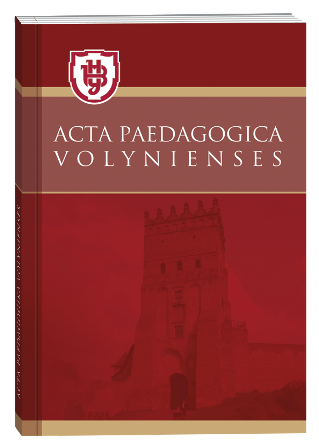INDEPENDENCE AND ITS IMPORTANCE FOR CHILDREN'S EMOTIONAL EDUCATION
DOI:
https://doi.org/10.32782/apv/2022.1.1.22Keywords:
independence, upbringing, preschool children, emotional upbringing, emotionsAbstract
The article is devoted to the theoretical analysis of scientific achievements on the problem of education of independence in preschool children. Children's independence has recently become more and more the object of increased attention of scientists, teachers and educators. The content of the article reveals the essence of the definition of «independence». The author presents generalized approaches to the understanding and interpretation of independence by O. Udina, M. Montessori, S. Kon, Z. Gurina. The author of the article focuses on the importance of independence for emotional upbringing in preschool age. Independence is a multifaceted psychological phenomenon of an individual's activity that has its own specific criteria. «This is a strong-willed personality trait as the ability to systematize, plan, regulate and actively carry out their activities without constant guidance and practical assistance from outside». Independence as a characteristic of the preschooler's activity is manifested in the ability to achieve the goal of activity without outside help. Preschool independence is manifested through self-awareness, which is determined by the activities and abilities of the individual, which are related to the ability to organize themselves. Manifested in purposefulness, activity, reasonable motivation, planning their activities, independence, speed of decision-making and responsibility for them, critical evaluation of the results of their actions, a sense of duty. Independence develops gradually, and this process begins in harmony with the manifestations of psychological, emotional, communicative, cognitive. Considering preschool age as a period of personal qualities, the concept of modern Ukrainian education defines the essence of a new approach to preschool education, based on the principles of variable content, pedagogy of development, active knowledge of the world through social activities, raising a child as an independent and enterprising creator.
References
Борисова О.Ф. Самостоятельность как база формирования социальных компетенций дошкольника. Детский сад от А до Я. 2008. № 1. С. 124–132.
Гуріна З.В. Розвиток самостійності як базової характеристики підростаючої особистості дитини. Проблеми сучасної психології: збірник наукових праць; КПНУ імені Івана Огієнка; Інститут психології ім. Г. С. Костюка АПН України, 2010. Вип. 9. С. 65–74.
Кон И.С. Психология ранней юности. Москва: Просвещение, 1989. 256 с. 30.
Коменский Я.А., Локк Д., Руссо Ж.-Ж., Песталоцци И. Педагогическое наследие. Сост. В. М. Кларин, А. Н. Джуринский. Москва: Педагогика, 1989. 416 с.
Рындак В.Г., Кулешова Е.И. Роль дошкольного периода в воспитании творческой самостоятельности младшего школьника. Вестник ОГПУ. Серия: педагогика. 2006. № 4. С. 116–123.
Савченко М.В. Підготовка педагогів до роботи з виховання самостійності в дітей дошкільного віку в ігровій діяльності. Гуманітарний вісник ДВНЗ «Переяслав-Хмельницький державний педагогічний університет імені Григорія Сковороди: зб. наук. праць. Серія: педагогіка. 2013 № 28. С. 283–288.
Удіна О.М. Виховання самостійності дошкільників в образотворчій діяльності : автореф. дис. … канд. пед. наук : спец. 13.00.08 «Дошкільна педагогіка» ; Ін-т проблем виховання АПН України. Київ, 2008. 21 с.
Швець О.М. Види художньої діяльності з паперу. Запоріжжя, 2003. 71 с.







